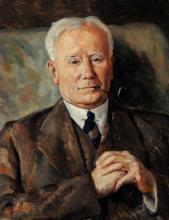Robert Ranulph Marett, a philosopher and anthropologist, was born on 13 June 1866 at Blanc Pignon on Jersey to Sir Robert Pipon (1820-1884), attorney-general and later bailiff, and his wife and cousin, Julia Anne (born ca. 1820), the youngest daughter of Philip Marett of La Haule.
Marett began his education at a local dame school. From nine to fourteen, he attended St Aubin’s School and afterwards Victoria College. In November 1884, he won a senior exhibition at Balliol College, Oxford, and he persuaded the college to allow him to come into residence that academic term, which he did in the Hilary term of 1885. In 1888, he then obtained a first-class degree in literae humaniores.
In 1890, he undertook some tutoring for Balliol and acted as university secretary to Toynbee Hall. In 1891, he was appointed to a fellowship at Exeter College, with which he remained associated for the rest of his life. In 1893, he became sub-rector of the college and tutor in philosophy. The same year he also won the Green moral philosophy prize. His subject was ‘The Ethics of Savage Races’.
The Green moral philosophy prize heralded Marett’s arrival to anthropological scholarship, and he became and was greatly involved in introducing the teaching of anthropology at Oxford, which was first examined there in 1908. Earlier, in 1907, he became secretary to the committee for anthropology, which had been set up two years previously to oversee a diploma in the subject, and he remained active on the committee thereafter. He also played a role in founding the Oxford University Anthropological Society in 1909, which still survives, although it has been intermittently dormant. On the retirement of Tylor, in 1910, Marett was appointed reader in social anthropology.
On 5 July 1898, Marett marred Nora (d. 1954), the daughter of Sir John Kirk (1832–1922) and Helen Cooke. He and his wife had four children, one of whom was Sir Robert Hugh Kirk Marett, the author and diplomat. In 1914, the Marett family moved from Oxford back to the family home, La Haule, on Jersey, and Marett divided his time between there and Oxford.
During World War I, Marett was selected as part of a skeleton staff to run the university, though he joined a battalion of veterans with regular military duties. After the war, Marett continued as tutor at Exeter until 1928, when he was elected rector of the college. He obtained a DSc at Oxford in 1913 and was awarded an honorary LLD from the University of St Andrews in 1929 and a DLitt from Oxford in 1937.
As for Marett’s contribution to anthropology, the debates to which he contributed such as those on manna and the origin of religion were primarily those of a nineteenth-century evolutionist. Although there was considerable energy left in them, what was to become mainstream anthropology was already diverging from this course; thus, in the end, Marett’s scholarship left little influence.
Marett’s final years were darkened by the loss of his elder son, who was killed at Narvik abroad the HMS Glorious in June 1940, and by the German occupation of Jersey. It was during this time that he wrote his autobiography, A Jerseyman at Oxford (1941). He died on 18 February 1943, while still rector of Exeter and still active in university affairs. He was cremated in Oxford after a service in Exeter College chapel.
Other works by Marett include: Anthropology and the Classics: Six Lectures Delivered before the University of Oxford by Arthur J. Evans et al. (editor; 1908); Anthropology (1912); the introduction to E. O. James’ Primitive Ritual and Belief (1917); Psychology and Folklore(1920); Raw Material of Religion (1929); Threshold of Religion (1929); Faith, Hope and Charity in Primitive Religion (1932); Spencer’s Last Journey: Being the Journal of an Expedition to Tierra Del Fuego by the Late Sir Baldwin Spencer (editor, with T. K. Penniman; contributions by Sir James Frazer and H. Balfour; 1931); Head, Heart & Hands in Human Evolution (1935); Spencer’s Scientific Correspondence with Sir J. G. Frazer and Others(editor, with T. K. Penniman; 1932); Lewis Richard Farnell, 1856–1934 (1935); Tylor (1936);Man in the Making (1937); James George Frazer, 1984–1941 (1942).
*from Peter Rivière, Oxford Dictionary of National Biography (Oxford University Press, 2004), http://www.oxforddnb.com/view/article/34872.



